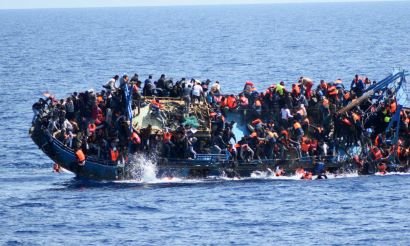Boats of doom
Rafia Zakaria

IT is being called the worst migrant boat disaster in the Mediterranean Sea. A week ago, a migrant boat carrying up to 750 people, 400 of them said to be Pakistanis, started to have trouble with its engine. After three days of being stranded, the boat capsized and most of the passengers died — in fact, all of them, except for 104, who were rescued. Among the survivors were only 12 Pakistanis.
The boat smugglers who run these migrant boats had promised its passengers passage from Libya to Italy. The accident took place off the shores of Greece.
In the hours after news of the boat disaster spread, relatives of the Egyptians, Syrians and Pakistanis, and possibly other nationalities, on board gathered in Kalamata in Greece to find out whether their relatives had lived or died. Most of course, were indeed dead, their journey to a better life having, ironically, taken their own life.
Pakistanis reporting on the boat disaster have emphasised how the Pakistanis on the boat were treated worse than the other passengers by the Egyptian boat operators. They were kept below the deck in absolutely disgusting and fetid conditions and their travel documents like passports etc, were taken away.
According to Yiva Johansson, the EU commissioner for home affairs, there has been a 600 per cent increase in the number of these boats running the Mediterranean passage. The majority, it seems, have little hope of actually accomplishing their goal of getting people safely to the EU countries where they want to go to live a better life. As Johansson puts it the passengers are being sent “to their deaths”.
On 19 June, a few days after the accident, the Greek version of the story which holds that the boat was on course to Italy was being questioned. A BBC report looked at tracking data from passing ships to see the boat’s location. They found that the Greek narrative which held that the Greek coastguard did not assist the ship because the boat was on a steady course to Italy may not be true. The boat was actually stationary for several hours near the Greek coast — giving plenty of time to the coastguard to assist it.
The issue of Greek or Italian or any other European nation failing to rescue migrants has become normalised in recent years. Again and again, there are absolutely heartrending stories of migrants taking extreme risks to get to the European Union because they believe that they will have a better life in Europe. This idea itself requires some questioning given the dire economic situation in many European countries.
Greece and Italy, for instance, are both in economic decline, with rising unemployment in the post-Covid era. In the case of this particular boat catastrophe, nine Egyptian men, allegedly the smugglers who ran the boat, have appeared in court. Institutions such as the Greek, or in other cases the Italian, coastguard have, as per usual, escaped accountability even as the United Nations has called the efforts at saving migrant boats dismal.
In Pakistan itself, people need to be better educated about the actual opportunities available to them in the EU. The gradual decline in employment opportunities available in Saudi Arabia and the rest of the Gulf in general, all of which are trying to transition to more locally staffed workforces, are one reason that more and more Pakistanis have been found travelling on migrant boats.
This is exactly why a public information campaign that underscores not only the extreme risks that these boats represent but also the life that awaits them even if they do get to Europe, is a desperate need. As anyone who has travelled to the EU can attest, migrants who make it are either sequestered in horrendous conditions in filthy refugee camps (such as the one on the Italian island of Lampedusa) or seen cold and shivering hawking trinkets at tourist sites. The risk is far greater than the reward of getting to the EU countries.
As a labour-exporting nation, Pakistan and Pakistanis need to be aware of these conditions and have a cohesive policy that deters people from taking these journeys. Recognising employment trends should help produce a more thorough labour policy where the mid- and high-skilled jobs that will become available because of remote work can come to Pakistan.
Source: Dawn, June 21, 2023
